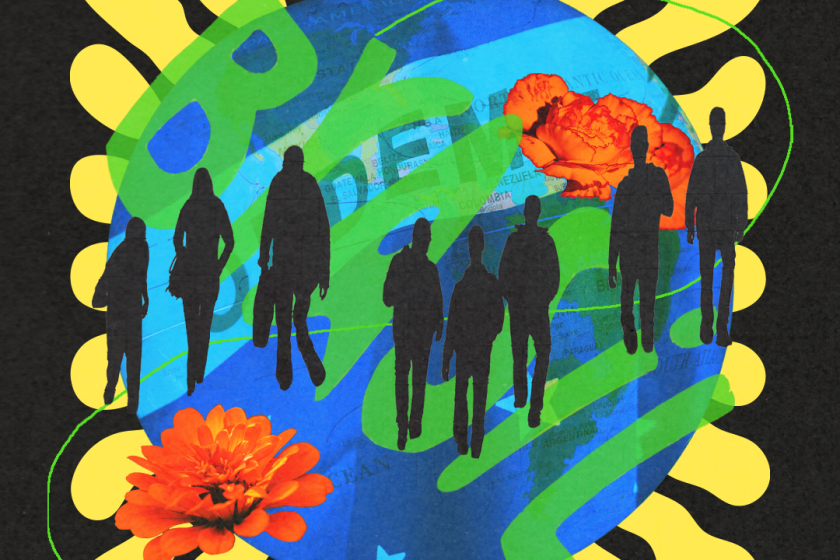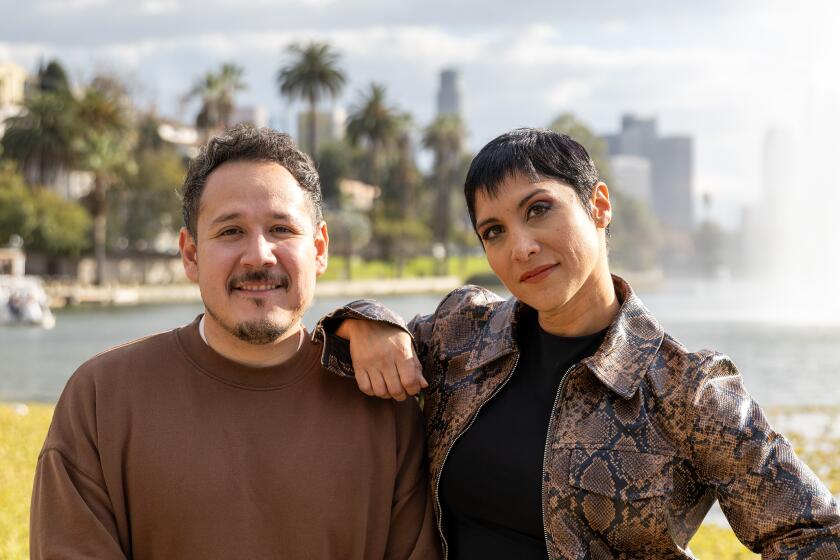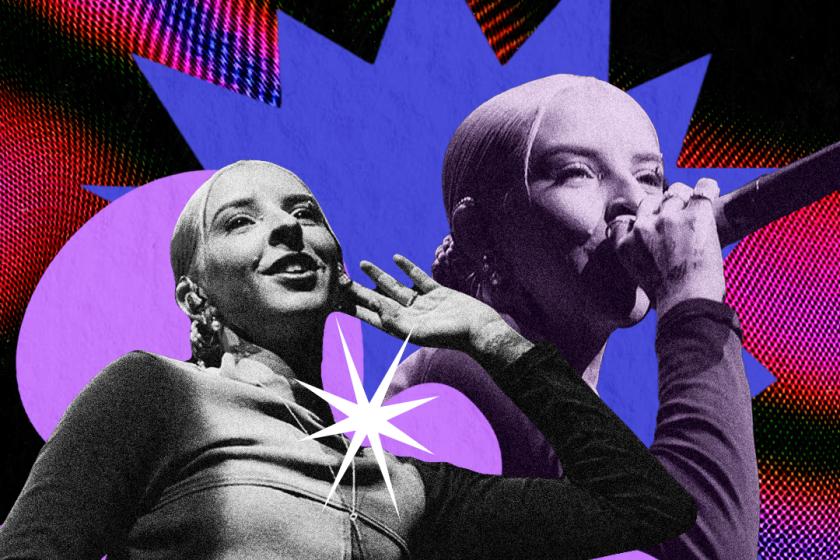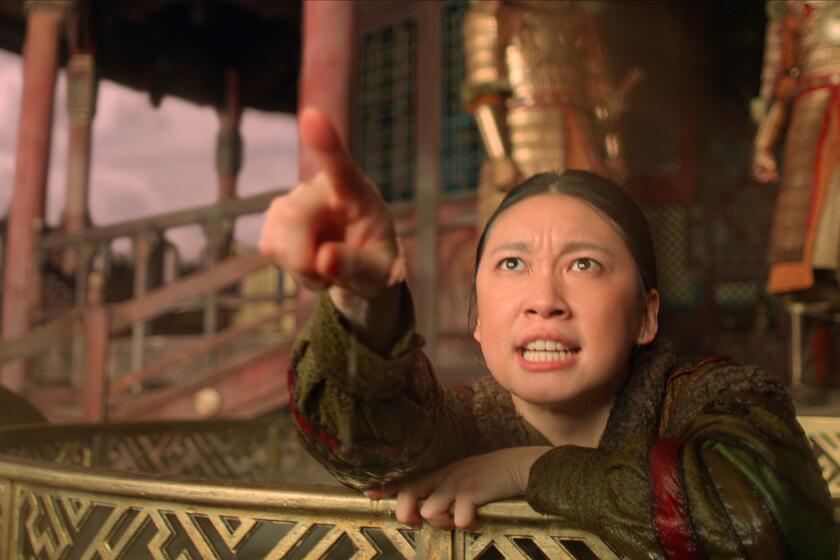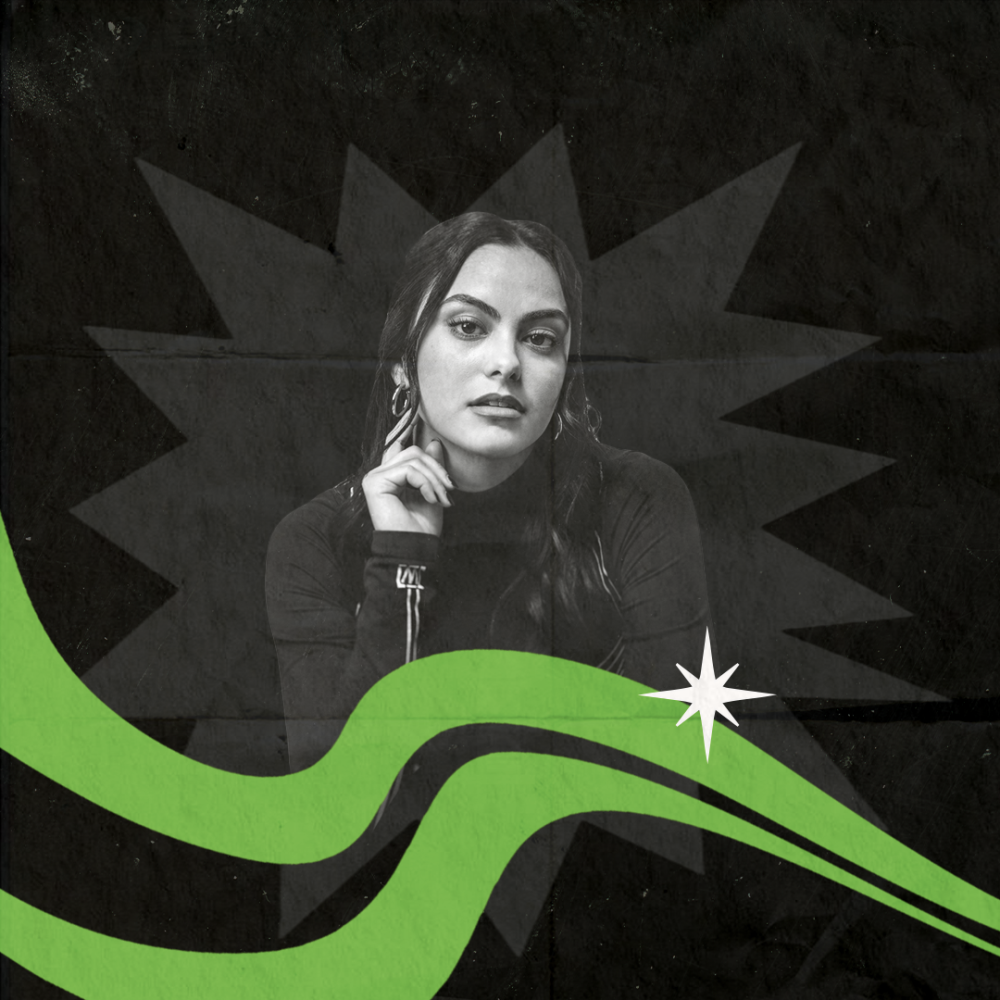
- Share via
Since booking her breakout role in the CW drama “Riverdale” in 2017, Camila Mendes has skyrocketed to fame as one of the most prominent Brazilian American stars in Hollywood. Yet, despite building on her success with acclaimed projects such as Netflix’s “Do Revenge” and Hulu’s “Palm Springs,” the actor says she has yet to receive a single script calling for a Brazilian role. “I get asked to play everything under the sun, every different kind of Latina, except Brazilian,” she says.
The concept of Latinidad in the U.S. is changing. One byproduct of recent shifts might be more room for Brazilian Americans to have a voice.
That’s what drew her to her latest project, “Música,” a coming-of-age musical romantic comedy directed by and starring Rudy Mancuso, which premiered this week at the South by Southwest Film and TV Festival. “Música” tells the story of Rudy, an aspiring artist trying to navigate his future as he’s pulled in different directions by his overbearing mother (Maria Mancuso), his girlfriend, Haley (Francesca Reale), and his new crush, Isabella (Mendes). It’s a charming, unorthodox musical that doesn’t feature traditional musical numbers. Instead, drawing on Rudy’s synesthesia, the film bursts to life in sequences where the surrounding environment — a nearby basketball game, kids playing jump rope, a lively game of checkers at the park — all become part of a symphony.
Mendes was hesitant about the project at first — Mancuso was a first-time director, and he had initially risen to fame on YouTube and Vine. But her reservations melted away when she spoke with him and learned how passionate he was about getting the film made, as well as his desire to expose more audiences to the Brazilian American experience. “Deep down, I think I always knew I was going to take the role,” she says. “How could I say no to this opportunity?”
The film’s on-screen love story evolved into a real one off-screen, with Mancuso and Mendes celebrating their one-year anniversary last July. “Música” will be available to stream on Prime Video on April 4.

“Música” is the second rom-com you’ve starred in and produced this year. Is that something you want to do more of?
The rom-com thing is completely coincidental. [Laughs] It’s funny, because I know that “Música” is technically a rom-com, but to me, it didn’t feel like any rom-com I’d seen before, so I never categorized it that way in my head.
When you hear “musical,” I’m sure a lot of people start imagining structured song-and-dance numbers, which is very different from what we see in “Música.” What convinced you to sign on?
Rudy’s team sent me the script with a kind of sizzle reel — basically a short version of the opening scene — just to give an example of the vision. It would say in the action, “It breaks into a musical number with people banging on pots and pans,” but you don’t know what that actually looks like without an example. That got me excited, but also, I was skeptical. I didn’t know much about Rudy. I just knew that he was a Viner, so I had my own preconceived notions of what that meant, and I was also just in my head about my career choices at the time. But I decided to meet with him because I wanted to meet a fellow Brazilian in the industry, and he was obviously very talented. When I met with him, I was floored. I knew I needed to work with him, but I also knew I had to produce this. It was the only way I would sign on, because I had notes about my character, Isabella.
What stood out to you that you wanted to change?
Well, I really wanted to develop not just my character but the other female role, Haley. I wanted to make sure they felt fully realized and complete. Rudy was like, “Absolutely, that’s part of the reason we want you on board.” So over the course of a few months, I would Zoom with him to work on scenes and dialogue and make sure, especially for Haley’s role, that she wasn’t just the rich white girl, that we weren’t making their dynamic so binary. Then obviously, we personalized my role and gave her a little bit more of a backstory.
Why was creating that backstory important to you?
With love stories, you really need to understand the conflict. What is it about Isabella that interests him, and what is it about him that triggers Isabella? I wanted her to be authentic, so what ended up happening was that I brought some of my own struggles to the role in order to kind of find her as a character.
Beyond you and Isabella sharing the same Brazilian American background, what were some of those personal elements that bled into the character?
I mean, it’s exaggerated and not necessarily a mirror of what my upbringing was like, but a little bit of her backstory. I can say this now because we’ve talked about it and we have a great relationship, but when I was finishing up high school, my mother moved back to Brazil to live with a guy she was seeing. My parents were divorced and I went to move in with my dad. During that time, I remember having gone through my first heartbreak as a kid and really wishing my mother was there. I remember as a teenager that absence and that feeling of abandonment. I thought that was a good thing to incorporate into Isabella’s character because you have Rudy’s character, who’s so annoyed by his mother’s love and overwhelmed with how involved she is in his life. I think it’s nice to have a character like Isabella who’s like, “Actually, I wish my mom was more involved in my life.” I just took that one little thing from way back in the day and kind of pulled from that so that I had an avenue into her character and her pain.
How did it impact you finally getting to play a character who spoke to some of your experiences?
I think story-wise, the emphasis on family in Brazilian culture is something that I’ve really grown to embrace more. Especially now dating a Brazilian, it’s opened me up to that perspective of really putting more of an effort and to stay close to family to see them more. Obviously, being in Hollywood for so long, you can get so career-focused and make everything about success. But the older you get, the more you realize that’s really not what matters. I want to be able to look back on my life and feel like I created strong relationships with the people that I love. And I think this movie has a really strong message with that.
‘In the Summers’ is the first project by Luz Films, an L.A.-based company focusing on producing Latinx prestige pictures. The film took the top prize at the 2024 Sundance Film Festival.
This is the second project out this year that you’ve worked on as an actor and a producer. What motivated you to step into that role?
I think producing for me was a way to make sure that I was protected. Especially coming from a teen show, I’m so cautious with who I work with, and I want to make sure that they’re going to represent me well. That’s a big fear that I have, because when you’re on a show, you work with a new director every episode and you have very little control of the outcome. You might watch an episode and see that they cut it in a certain way and now you look like a bad actor. You feel like you’re being misrepresented. So for me, my avenue into producing was trying to take control and having creative authority and protecting myself. That’s evolved to be a deeper passion and love for the art of producing as a whole, but that’s definitely how it started.
As a producer, you have a whole new layer of interest vested into this story than you did as an actor. What do you hope people take away from their experience watching “Música”?
From a personal standpoint, I’m very excited for people to see what Rudy is capable of. I know that there’s such a stigma around being an internet personality and having your talent undermined. So I’m just so excited for people to see just how creative and visionary he is.
But I’m also excited for people to get a glance into Brazilian culture, because there’s truly no movies representing Brazilian culture right now. And there’s something even more nuanced about “Música” in the sense that it’s Brazilian American, which I think is accessible to a lot of children of immigrants. You don’t have to be Brazilian to relate to the story. Anybody who feels the duality of being an immigrant child, having one culture passed down to them but living an entirely different one, knows that clash of ideologies can be so difficult to navigate. Seeing Rudy navigate those dualities was refreshing because I’m navigating the same one. It’s been really great to have somebody who understands my experience, so I hope that there are people watching this movie who will also relate and feel seen.
Was part of your motivation for getting into producing wanting to expand Brazilian representation in the industry?
Oh, absolutely. I just don’t think there are enough people behind the camera creating that platform, so I just feel very lucky that I get to be part of the beginning of it. I kept telling Rudy, Brazilians need to have their “Crazy Rich Asians” moment, where resilience can finally feel seen.
How do you hope “Música” plays a role in expanding people’s awareness of Brazilian culture and the Brazilian American experience?
On a very, very microscopic level, I think it would be great if it helped people learn that Brazilians speak Portuguese. [Laughs] That would be a big win for us. But also, Brazilian culture is so beautiful, and it’s never showcased in a romantic way. I think a lot of people’s exposure to Brazil in film is like “City of God”-type violence. That is part of the Brazilian story, but it’s just one aspect. There’s this whole other side to it that isn’t really celebrated in film. I’m excited for people to hopefully recognize that.
More to Read
The Latinx experience chronicled
Get the Latinx Files newsletter for stories that capture the multitudes within our communities.
You may occasionally receive promotional content from the Los Angeles Times.
